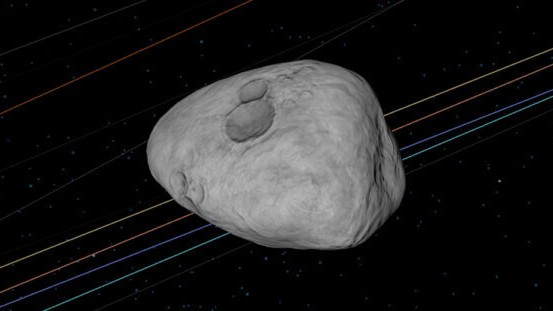Asteroid feared to hit Earth in 2046 will almost certainly miss, NASA says
An asteroid that was initially given 1-in-600 chance of wiping out an entire city on Valentine's Day 2046 is now expected to almost definitely whizz past us without incident.

After a brief flirtation with doom, the newly discovered asteroid that was given a 1-in-600 chance of slamming into Earth on Valentine's Day 2046 is now highly unlikely to hit our planet, NASA announced.
The asteroid, which was first detected on Feb. 27 and named "2023 DW," measures about 165 feet (50 meters) in diameter, or roughly the length of an Olympic-size swimming pool.
Initially given a slim but possible chance of a direct impact by NASA's Planetary Defense Coordination Office, the threat posed by the asteroid generated a flurry of news coverage advising readers to reconsider any romantic plans made for 2046. Now, NASA has revised this estimate, putting the asteroid's chances of hitting Earth at around 1-in-770, meaning it has a 99.87% chance of missing us. The European Space Agency's (ESA) Near-Earth Object Coordination Centre has also lowered its risk estimate — downgrading the impact odds from a 1-in-625 chance to around 1-in-1,584.
Related: Could an asteroid destroy Earth?
"It will go down now with every observation until it reaches zero in a couple of days at the latest," Richard Moissl, the head of the ESA's planetary defense office, told Agence France-Presse on Tuesday (Mar. 14). "No one needs to be worried about this guy."
NASA tracks the locations and orbits of roughly 28,000 asteroids, following them with the Asteroid Terrestrial-impact Last Alert System (ATLAS), an array of four telescopes that can perform a scan of the entire night sky every 24 hours. The space agency flags any space object that comes within 120 million miles (193 million kilometers) of Earth as a "near-Earth object" and classifies any large object within 4.65 million miles (7.5 million km) of our planet as "potentially hazardous."
NASA has estimated the trajectories of all these near-Earth objects beyond the end of the century. Earth faces no known danger from an apocalyptic asteroid collision for at least the next 100 years, according to NASA.
Sign up for the Live Science daily newsletter now
Get the world’s most fascinating discoveries delivered straight to your inbox.
If 2023 DW did smash into Earth, it would not be a cataclysmic event like the 7.5-mile-wide (12 km) dinosaur-killing asteroid that struck Earth 66 million years ago. But this doesn't mean smaller asteroids of its size aren’t dangerous. In March 2021, for example, a bowling ball-size meteor exploded over Vermont with the force of 440 pounds (200 kilograms) of TNT. Even more dramatically, a 2013 explosion of a 59-foot-wide (18 m) meteor above Chelyabinsk, Russia, generated a blast roughly equal to around 400 to 500 kilotons of TNT, or 26 to 33 times the energy released by the Hiroshima bomb, and injured around 1,500 people.
Space agencies around the world are already working on possible ways to deflect a dangerous asteroid if one were ever headed our way. On Sept. 26, the Double Asteroid Redirection Test (DART) spacecraft redirected the non-hazardous asteroid Dimorphos by ramming it off course, altering the asteroid's orbit by 32 minutes in the first test of Earth's planetary defense system. NASA has since hailed the mission as a success beyond all expectations.
China has also suggested it is in the early planning stages of an asteroid-redirect mission. By slamming 23 Long March 5 rockets into the asteroid Bennu, which will swing within 4.6 million miles (7.4 million km) of Earth's orbit between the years 2175 and 2199, the country hopes to divert the space rock from a potentially catastrophic impact with our planet.

Ben Turner is a U.K. based staff writer at Live Science. He covers physics and astronomy, among other topics like tech and climate change. He graduated from University College London with a degree in particle physics before training as a journalist. When he's not writing, Ben enjoys reading literature, playing the guitar and embarrassing himself with chess.










